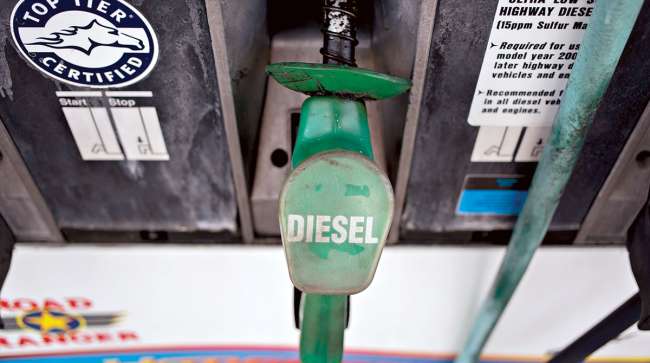Senior Reporter
Diesel Dips 0.3¢ to $3.025 a Gallon

The U.S. average retail price of diesel dipped 0.3 cent to $3.025 as the cost of crude slipped to just below $64 a barrel.
Oil touched $66 a barrel later in the week amid a report U.S. crude inventories are on a record decline.
Also, it was the second consecutive week of average diesel prices above $3, which last happened in the two weeks following Dec. 29, 2014.
Diesel now costs 45.6 cents more than it did a year ago, when it was $2.569 a gallon, the Department of Energy reported Jan. 22.
The price of trucking’s main fuel rose on the East Coast and in California. It declined in the five other regions.
The U.S. average price for regular gasoline inched up 1 cent to $2.567 a gallon, and was 24.1 cents higher than it was a year ago, DOE’s Energy Information Administration said.
Gasoline cost more in every region except the Midwest, where it fell 3.8 cents to $2.469 a gallon.
At the same time, inventories of U.S. crude fell 1.1 million barrels during the week ending Jan. 19 compared with the previous week, EIA reported Jan. 24. It was the 10th consecutive drop.
That is the longest stretch of declines on record, according to Bloomberg News.
Demand for stored supplies in the world’s biggest economy has been robust at a time of year when it’s usually weakening because of refinery repairs, all against the backdrop of production curbs by OPEC, Russia and other major suppliers, Bloomberg reported.
An executive at North America’s largest carrier in the tank and bulk sector sees the price of diesel climbing more.
“Diesel prices are on an upward path at least for the foreseeable future,” Kirk Altrichter, vice president of fleet services at Kenan Advantage Group Inc., told Transport Topics.
Diesel will continue to climb, he said, unless domestic oil production increases with more fracking.
Kenan Advantage Group ranks No. 25 on the Transport Topics Top 100 list of the largest for-hire carriers in North America.
It has about 300 terminal and satellite locations throughout North America.
As fuel prices rise, Altrichter said an increase in the fuel surcharge can affect the North Canton, Ohio-based carrier’s relationships with shippers is not being efficient, not spec’ing the right equipment on its trucks. “Shippers are watching the market as much as we are and see where the prices are at.”
Kenan Advantage’s fleet uses 16,000 gallons of diesel per truck per year, and it operates about 7,000 trucks — for 112 million gallons annually.
“The game is that the fuel price changes daily, and are you making the right decisions in buying it in the morning or waiting until evening? That is always a guessing game,” Altrichter said.
Kenan Advantage each year delivers more than 26 billion gallons of refined petroleum products in the United States.
The challenges of supplying fuel across the country is inevitably tied to getting good solid professional quality people, said Grant Mitchell, the company’s chief operating officer. “That’s professional drivers, mechanics and people in all of our terminals, including our dispatch and scheduling centers.”
Meanwhile, regarding the increased amount of industry news devoted to electric vehicles, Mitchell said Kenan Advantage is paying close attention to the all the related announcements and releases.
“By no means have we made any decisions in terms of where we are going to go as a company from this perspective. We certainly are very active in staying informed and discussing it as a team,” he said.
In the meantime, West Texas Intermediate crude futures on the New York Mercantile Exchange closed at $63.49 per barrel Jan. 22 compared with $63.73 on Jan. 15. Then on Jan. 24, WTI futures closed at $65.61.
“The United States is poised to become the undisputed oil and gas producer in the world over the next several decades,” Fatih Birol, executive director, International Energy Agency, said in an appearance Jan. 16 before the Senate Committee on Energy and Natural Resources.
IEA cited U.S. producers’ ability to unlock new shale oil and gas resources cost-effectively.
That said, the weekly U.S. oil rig count fell to 747 during the week of Jan. 19, five rigs fewer than the week before and 196 more than a year earlier, oil-field services company Baker Hughes reported.
Houston-based Baker Hughes ranks No. 15 on the Transport Topics Top 100 list of the largest private carriers in North America.

